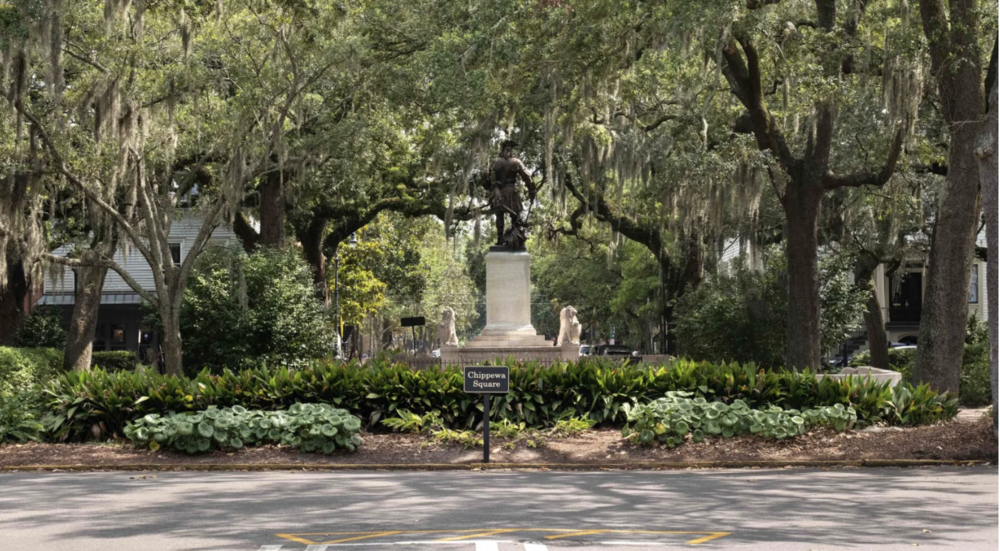
Caption
The location “the bench” in Forrest Gump looks much different now than in 1993, when the movie was filmed.
Credit: Justin Taylor/The Current
By Audrey Gibbs
From the image of Forrest Gump sitting on a park bench in Chippewa Square to the chase scene starting at Forsyth Park in The Longest Yard, Savannah’s landscapes have become an iconic part of American cinema and brought millions of dollars to the local community.

The location “the bench” in Forrest Gump looks much different now than in 1993, when the movie was filmed.
State officials this month are peering behind the scenes of the movie business in Coastal Georgia to evaluate the benefit of lucrative tax credits that put Savannah on Hollywood’s map. The city has earned the ranking of third-best small city and town to be a movie maker, according to MovieMaker magazine.
The review by state lawmakers comes following a report published in October 2022 by the Georgia Department of Audits & Accounts reviewing the impact of Georgia film tax credits on local economies. It’s expected to address one missing piece of data that neither production companies nor industry boosters track: the number of local jobs and the kinds of permanent jobs created as the state has rewarded the industry with billions of dollars in tax credits.
The audit report says that in 2019 industry jobs totaled 16,500, but while 80% of the jobs went to Georgia residents, a majority of the wages earned — 53% — went to nonresidents, like film stars and senior actors.
The Savannah Regional Film Commission says streaming hits like Manhunt and The Girl from Plainville brought approximately $207 million of direct spending in 2022 to the city. But no state or film industry body could provide an accurate count of jobs created.

The Film Savannah office on Forsyth Park in Savannah
Statewide, Georgia reported $4.4 billion in direct spending for fiscal year 2022.
Many residents attribute this spending to a statewide tax incentive, where certain Georgia-filmed projects can receive an across-the-board flat tax credit of 20%. Productions may even be able to add an additional 10% uplift by putting a promotional Georgia logo into their film.
Essentially, a filmmaker who plans to spend $1 million on their film project in Georgia may receive a tax credit of up to $300,000 back from the state. Often, film companies will sell the tax credit — which is transferable — because they will have little Georgia income tax liability. Meaning, they won’t owe as much to the Georgia government, so selling the credit can monetize it for the production companies and benefit other Georgia-based companies who may owe more income tax to the state.
Productions approved for the credit can include feature films, television movies or series, documentaries, commercials, and music video projects that spend an annual $500,000 on qualified expenditures in Georgia. Items that count towards the tax credit can be anything from insurance purchased through a Georgia agency or meal catering to cameras, cranes and boom-mics. Payrolls count towards the credit, too — but only up to $500,000.
Auditors say the Georgia Department of Economic Development (GDEcD) has severely exaggerated the impact of the credit in previous years. The credit currently has no cap, and there have been calls to cap it at $900 million-a-year by Georgia Senate Finance Committee Chairman Chuck Hufstetler, but the attempt was shot down in 2022. A new recommendation and analysis of the credit is planned to take place before January 2024.
Some argue the tax credits result in significant loss of income for the state and cause neglect in state-funded projects that could use the money being returned to film makers. Additionally, past reports by the GDEcD have inflated the number of jobs created by the credit, counting film distribution jobs like movie theater workers. The auditors and Department of Economic Development have previously disagreed on if certain jobs should be attributed to the credit in data collections.
In response to auditors saying the GDEcD claimed false job-creation figures, they said they “stand(s) by its reporting of the direct spend and job figures related to the film industry in Georgia, as this information comes directly from its expenditure form collected from all applicants, as well as other reputable sources.”
Additionally, many of the direct production jobs in the film industry aren’t counted as full-time jobs because they are by contract, says the Georgia Film Office, who works under the GDEcD. “Due to the highly mobile nature of the industry, with multiple filming locations and communities that may be impacted by a project, it’s difficult to provide specific direct job numbers for any single community in the state,” said the Georgia Film Office.
In Coastal Georgia, job creation is not being tracked, according to The Savannah Economic Development Authority (SEDA).
SEDA said that the Savannah film industry operates on a gig-based economy where individuals often work on a freelance basis or may be paid a day rate. Due to this, they say they have not been able to track job increases or decreases.
SEDA passed an incentive for film productions to hire locals in Chatham Country in 2019, just months before the COVID-19 pandemic shut down most film production; if over half their staff is local, productions receive a $25,000 rebate. But, no completed productions have yet to reach this percentage and claim the credit.
Several local businesses earn the majority of their living from the film industry. They say the state tax credit is a boon to their livelihood.
“I’ve just been doing movies down here because the tax credits have been really giving a lot of people incentive to move here,” said Bill Marinella, a Georgia-based casting director, who has worked on at least a dozen projects based specifically in Savannah over the past 4 years. He’s currently casting extras in Savannah for a Clint Eastwood film starring Nicolous Hoult titled Juror #2.
Marinella moved to Georgia because the tax credits were more lucrative than other states.

Crews and equipment for Juror #2, Clint Eastwood’s final film, line 40th Street in Baldwin Park.
Marinella attributes much of his success maintaining work in Savannah to the city’s ability to stand in for other locations. It’s also become a place where newcomers can get experience quickly. “A lot of people are moving up the chain. There’s a lot of production assistants who are becoming assistant directors very, very quickly,” he said.
Kaylon Damazio, a film transportation coordinator and animal wrangler, moved to Savannah to work in the film industry. “I got a random call for a job out here [Savannah] back in fall of 2016 came out here for the job and ended up meeting my wife—she also works in the industry,” said Damazio. Now, Damazio has been benefitting from the increasing film production in the area; he has been working much more reliably than when he first moved to the area.
Other businesses who aren’t film industry professionals see occasional boosts in sales. Alex Eckard, whose family owns Eckard’s Flooring Design Center, estimates he works on flooring for production sets 1 to 2 times each year. “They’re a different type of customer; they come in with a real vision of what they’re looking for, so it’s kind of fun to help them find what they’re looking for,” he said, while adding that such jobs are “not a tentpole of our business.”
One large factor holding Savannah back from becoming an even bigger player in the industry is its lack of film studios. A soundstage — a sound-proofed film studio — can provide a more controlled environment for filming. Having access to a soundstage means directors can control lighting, sound, special effects and camera angles in a different way than they would be able to while shooting on location. Renting a soundstage can be cheaper for productions, too.
Savannah City Council recently approved a project to build four sound stages and the beginning stages of the plan are estimated to kick off in 2024. “Once we get the soundstages it’s gonna be a whole different ball game,” casting director Marinella said.
Yet local businesses also agree that another limitation to job growth in Savannah is the temporary nature of the production calendar. Damazio said he knows many people who earn some job experience in the area and then head to bigger cities to pursue film careers. “They’ll start out at the bottom, maybe they’ll bump up, then after that they usually end up moving to Atlanta. It’s this never-ending cycle,” he said.
This story comes to GPB through a reporting partnership with The Current.